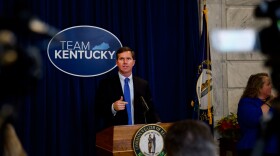This week, the U.S. Centers for Disease Control and Prevention took criticism for amending its COVID-19 testing guidelines to say people who had exposure to a case, but no symptoms, may not need testing.
In a Thursday afternoon COVID-19 briefing, Mayor Greg Fischer dismissed that new CDC guidance, suggesting it may not be valid guidance after all. But this summer, Louisville officials have also discouraged tests for those without symptoms.
Although CDC Director Robert Redfield backtracked a bit by midweek, experts challenged the idea of limiting tests to symptomatic individuals. Redfield said in a statement that “testing may be considered for all close contacts of confirmed or probable Covid-19 patients.” That change is not reflected on the CDC's website.
Health experts agree that asymptomatic people can spread the coronavirus, making it important to know if they carry the infection.
Gov. Andy Beshear said Thursday the CDC's changed guidance was "wrong," a day after calling it "reckless."
He acknowledged the CDC's apparent messaging change in his news briefing, saying it means "everybody needs to be tested, and tested regularly."
The message in Louisville hasn’t been the same.
On August 4, the city's chief health strategist Sarah Moyer spoke to WFPL about why the city's guidance differed from the state's on frequent testing. She said she believed the governor was describing an ideal situation in which there were enough tests and fast turnaround.
"If you don't have symptoms and you think you might be positive, you might as well just quarantine for two weeks, and then you're safe, if you don't develop any symptoms," Moyer said, adding that at the time the positivity rate for those without symptoms was less than 1%. That metric measures how many tests out of the total number come back with a positive result.
The lack of consistency from federal officials since the start of the pandemic has made it harder for state and local officials to communicate risks and guidelines, said Sarah Bass, an associate professor of public health and director of the Risk Communication Laboratory at Temple University's College of Public Health.
"So, what's happened is this kind of Wild West of COVID messaging and that, you know, everybody is saying something differently," Bass said.
Ideally, messaging during a pandemic would be fully led by public health officials, but that hasn't happened uniformly in the United States, she said.
"The effect of all of that is that you do have all of these different entities who are messaging in different ways," Bass said. "And then the public is, you know, kind of just throwing up their hands and saying, 'Well, at this point, I don't know what to believe.'"
The Local Approach
Fischer said Thursday the city's cumulative positivity rate since the start of the pandemic has hit a plateau at around 9%.
"We're still far away from where we want to be," Fischer said, adding that people should wear masks and practice social distancing to limit the spread of the virus.
Louisville is approaching 12,000 confirmed COVID-19 cases since March, and has lost 277 residents to the disease.
Bill Altman, who is consulting with Louisville Metro's Department of Health and Wellness on testing, said in July the city's positivity rate is somewhat inflated because of how tests are reported. He advised using the number as a directional guide.
Early last week, he described the order of priority when it comes to testing:
- Symptomatic people
- People who have been exposed
- High-risk groups
- Asymptomatic people seeking "peace of mind" testing
"I don't think we're at the point ... where we can say anyone who wants a test should go get a test, because the reality is, across the country and here in Louisville, there are limits to our testing capacity," Altman said last week. "But if you plan for it, and you need a test for whatever their purpose, you can get a test. It's just that we have to be prudent about how we are allocating our testing resources."
On Thursday, he said Louisville's approach is not the same as the CDC's.
"That is clearly not the plan that we're following," he said. "We have always said that one of the highest priority populations who should be tested ... are those who are known to have been exposed to someone who is positive, so we're not going to change our approach."
Rui Zhao is Louisville’s chief epidemiologist. He also said Thursday that the city is focused on prioritizing tests.
"We are trying to prioritize our resources to make sure that those who really need to get tested and really have a high likelihood of testing positive, make sure those individuals, and those vulnerable populations can get the resources that they need, immediately," Zhao said. "For those who are asymptomatic, they're less likely to have a negative health outcome, so therefore quarantining or isolating the would be ... an effective measure."
Beshear on Thursday said the CDC failed to say that quarantining could be an appropriate alternative to testing for asymptomatic people who may have been exposed to COVID-19.
"To suggest that you can just go on with your daily life, not take steps to prevent the spread of COVID or determine that you have it, that's just plain wrong with everything that we know about this virus," he said.
Bass, the public health expert, again blamed the federal government for throwing state and local governments to the wind.
"While the governor is right in that we should be doing that testing, the reality is for a lot of these municipalities it's very hard to actually put that in action," she said.
According to Bass, state and local government needs federal support to help them expand testing.






